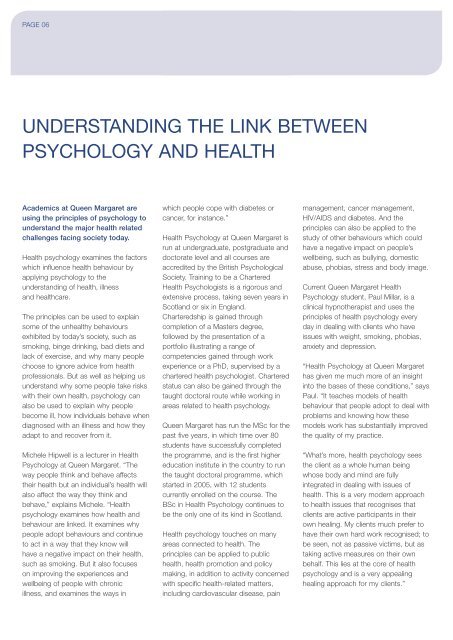QM News 63 (pdf 752KB) - Queen Margaret University
QM News 63 (pdf 752KB) - Queen Margaret University
QM News 63 (pdf 752KB) - Queen Margaret University
You also want an ePaper? Increase the reach of your titles
YUMPU automatically turns print PDFs into web optimized ePapers that Google loves.
PAGE 06<br />
UNDERSTANDING THE LINK BETWEEN<br />
PSYCHOLOGY AND HEALTH<br />
Academics at <strong>Queen</strong> <strong>Margaret</strong> are<br />
using the principles of psychology to<br />
understand the major health related<br />
challenges facing society today.<br />
Health psychology examines the factors<br />
which influence health behaviour by<br />
applying psychology to the<br />
understanding of health, illness<br />
and healthcare.<br />
The principles can be used to explain<br />
some of the unhealthy behaviours<br />
exhibited by today’s society, such as<br />
smoking, binge drinking, bad diets and<br />
lack of exercise, and why many people<br />
choose to ignore advice from health<br />
professionals. But as well as helping us<br />
understand why some people take risks<br />
with their own health, psychology can<br />
also be used to explain why people<br />
become ill, how individuals behave when<br />
diagnosed with an illness and how they<br />
adapt to and recover from it.<br />
Michele Hipwell is a lecturer in Health<br />
Psychology at <strong>Queen</strong> <strong>Margaret</strong>. “The<br />
way people think and behave affects<br />
their health but an individual’s health will<br />
also affect the way they think and<br />
behave,” explains Michele. “Health<br />
psychology examines how health and<br />
behaviour are linked. It examines why<br />
people adopt behaviours and continue<br />
to act in a way that they know will<br />
have a negative impact on their health,<br />
such as smoking. But it also focuses<br />
on improving the experiences and<br />
wellbeing of people with chronic<br />
illness, and examines the ways in<br />
which people cope with diabetes or<br />
cancer, for instance.”<br />
Health Psychology at <strong>Queen</strong> <strong>Margaret</strong> is<br />
run at undergraduate, postgraduate and<br />
doctorate level and all courses are<br />
accredited by the British Psychological<br />
Society. Training to be a Chartered<br />
Health Psychologists is a rigorous and<br />
extensive process, taking seven years in<br />
Scotland or six in England.<br />
Charteredship is gained through<br />
completion of a Masters degree,<br />
followed by the presentation of a<br />
portfolio illustrating a range of<br />
competencies gained through work<br />
experience or a PhD, supervised by a<br />
chartered health psychologist. Chartered<br />
status can also be gained through the<br />
taught doctoral route while working in<br />
areas related to health psychology.<br />
<strong>Queen</strong> <strong>Margaret</strong> has run the MSc for the<br />
past five years, in which time over 80<br />
students have successfully completed<br />
the programme, and is the first higher<br />
education institute in the country to run<br />
the taught doctoral programme, which<br />
started in 2005, with 12 students<br />
currently enrolled on the course. The<br />
BSc in Health Psychology continues to<br />
be the only one of its kind in Scotland.<br />
Health psychology touches on many<br />
areas connected to health. The<br />
principles can be applied to public<br />
health, health promotion and policy<br />
making, in addition to activity concerned<br />
with specific health-related matters,<br />
including cardiovascular disease, pain<br />
management, cancer management,<br />
HIV/AIDS and diabetes. And the<br />
principles can also be applied to the<br />
study of other behaviours which could<br />
have a negative impact on people’s<br />
wellbeing, such as bullying, domestic<br />
abuse, phobias, stress and body image.<br />
Current <strong>Queen</strong> <strong>Margaret</strong> Health<br />
Psychology student, Paul Millar, is a<br />
clinical hypnotherapist and uses the<br />
principles of health psychology every<br />
day in dealing with clients who have<br />
issues with weight, smoking, phobias,<br />
anxiety and depression.<br />
“Health Psychology at <strong>Queen</strong> <strong>Margaret</strong><br />
has given me much more of an insight<br />
into the bases of these conditions,” says<br />
Paul. “It teaches models of health<br />
behaviour that people adopt to deal with<br />
problems and knowing how these<br />
models work has substantially improved<br />
the quality of my practice.<br />
“What’s more, health psychology sees<br />
the client as a whole human being<br />
whose body and mind are fully<br />
integrated in dealing with issues of<br />
health. This is a very modern approach<br />
to health issues that recognises that<br />
clients are active participants in their<br />
own healing. My clients much prefer to<br />
have their own hard work recognised; to<br />
be seen, not as passive victims, but as<br />
taking active measures on their own<br />
behalf. This lies at the core of health<br />
psychology and is a very appealing<br />
healing approach for my clients.”

















